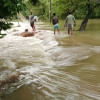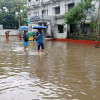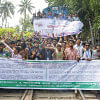“I witness nothing but ignorance towards Sylhet”

Electricity went out this morning and so chronicles an array of anxiety and fear, anger and frustration. The rain has been incessant and the water level keeps rising outside our home in Kumarpara, which is relatively in a higher ground than the rest of the city, but that doesn't mean that I am not in for a spectacle I'd never experienced before.
One of my lecturers, a resident of Shajalal Upashahar, one of the first areas to get flooded for the second time in less than a month, showed how he's been checking exam scripts under candle light; there has been no electricity for the last two days.
My friends who live in the same area either had to relocate to their relatives' places or just survive — one with the (waist-deep) water. Water has reached the inside of the power grid station.
This morning on June 18, Zindabazar, one of the busiest places in town, is flooded. People's homes are underwater, their belongings destroyed and washed away. All connections and communications have been lost with the people of Sunamganj.
The gravity of the situation finally crept in yesterday when the remaining of our semester finals were announced to be postponed indefinitely, following the news about the SSC examinations being postponed. This disrupts secondary and tertiary education in our country once again for three consecutive years, which will no doubt affect the admission process later due to the delayed results.
While the anger and the frustration of the last-minute cancellation of the exams is justified, however, it is disturbing to come across comments on Facebook and Instagram by some of my close friends living outside Sylhet that are saying they should've cancelled only the Sylhet's board exams.
The candidates in Sylhet are losing their shelters and have no electricity or mobile network — is it really that hard to understand their current headspace?
If the rest of the country sits for the exam while families in Sylhet look for ways to avoid drowning in the worst flood in decades, is it really that difficult to understand how it will affect the children's mental state and their outlook towards the already-flawed education system?
I have lived all my life in Sylhet and after spending all this time in the city people from all around the country show their so-called love for, I have witnessed and experienced no less than ignorance towards Sylhet whenever it faces any calamities.
Even though it has been announced the Bangladesh Army will rescue stranded people using boats, and various organisations have come down to the streets with food, drink, and medical aid to help the flood victims while raising funds, the situation is worsening. Thousands of people have been left marooned outside their homes and are taking refuge in flood shelters opened in different schools.
Does this country even have hope when a situation this devastating is not enough to be considered a national emergency, and the only help being provided is asking people to leave their homes, their belongings, their whole lives behind and relocating?
We are taught that prevention is better than cure, then why, despite it being a common knowledge that Sylhet is vulnerable to flooding due to heavy rain during monsoon, are we never alerted beforehand?
The Surma and Kushiara rivers continue to flow above danger levels and the onrush of hilly waters keep hitting the region. We have seen terrifying floods in the past yet no solution is given, rather natural disasters are somehow overcome and forgotten, while the people are forced to suffer through the crises — the losses of loved ones and possessions.
With no sign of hope, the people in Sylhet are always bracing themselves for the worst.
The writer is an undergraduate student of English at Metropolitan University, Sylhet.

 For all latest news, follow The Daily Star's Google News channel.
For all latest news, follow The Daily Star's Google News channel. 








Comments